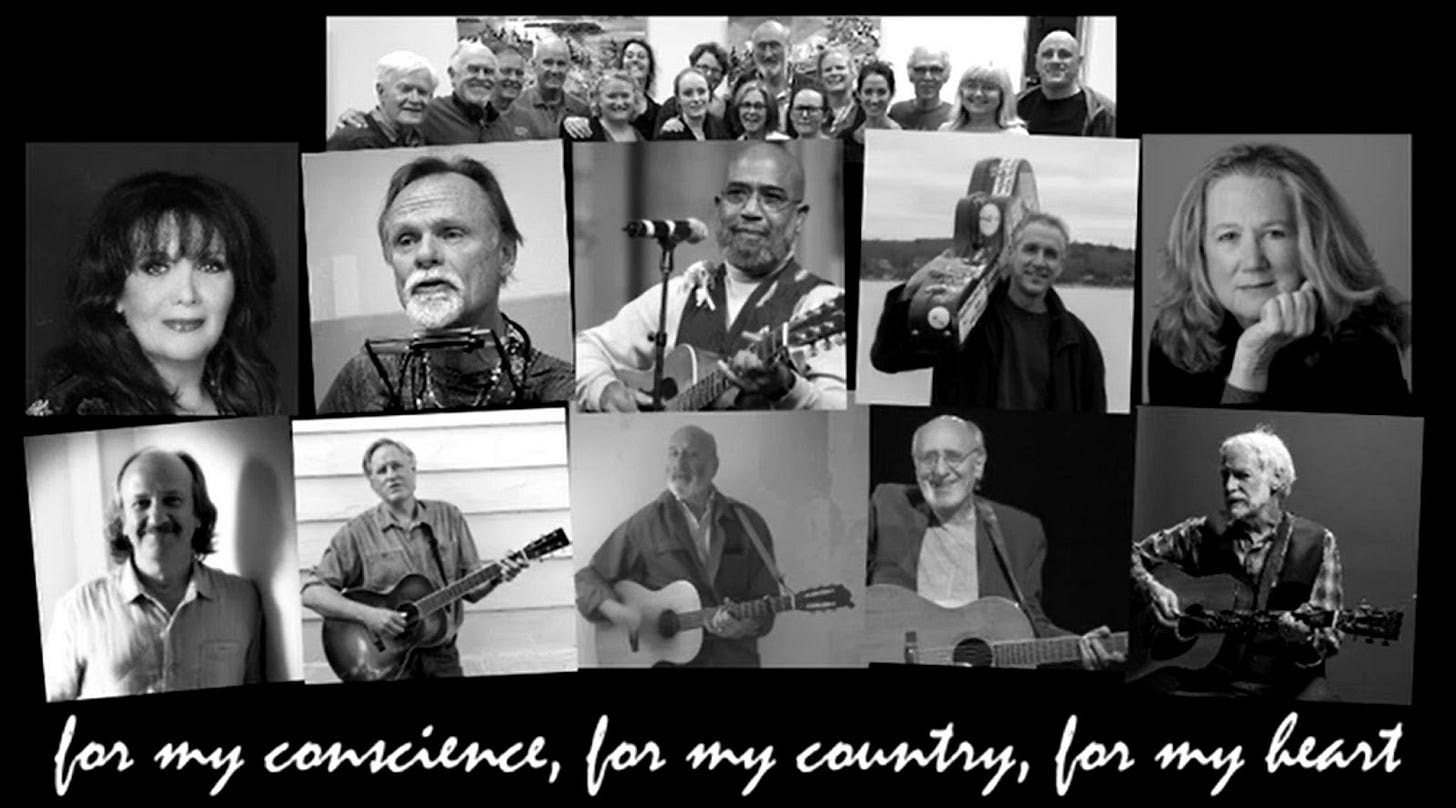Less than two weeks after the inauguration of President Trump, Noel explained to me the evolution of a song that he was writing.
The lyrics started as a resistance rant by Thomas J. Gray reacting to hollow dismissive assurances like “. . . what's done is done and it's time to work together.” The song quotes Gray's powerful testimony ‘I will not work together,’ echoing Mary Travers' observation that history has proven many times that too much compromise leads to complicity.”
Noel’s daughter Liz had cautioned him.
The repeated negative phrase “I will not…” weakens the power of the song. You should stress the positive, allowing other people to share so that it becomes a group of people saying, “I will stand, my God, I will stand. I will stand and do my part,” and have them sing lines out of what they will not work for or work together on.
Additionally Liz had suggested that the piece would really have power, really have legs, if the singers included people who stood up in the 60's and 70's and are carrying a concern that they’ve always had – like Josh White, Jr, Tom Chapin, Holly Near, Peter Yarrow – all of whom at some point in the 60s and 70s took a stand that was not necessarily popular. She also suggested having newer folk artists like David Mallett, Maureen McGovern and David Roth join them as well.
Then Noel recounted other conversations leading to the release of the song,
When Peter called, reduced to tears, he could not speak. . . . Betty is all for me to get the song out there, but when I got a request from Christine Lavin who said, “I sent it out to a friend of mine who is a disk jockey for a big folk station in NY state and he wants to play it Sunday. Is that OK?” . . . . The decision I made was no. I don’t want it out there this soon. I know that every day we delay, Trump appears more and more acceptable in terms of his connection with a broader audience. But I’m beginning to think that the more that happens, the more obvious the injustices, and that’s only going to make the message stronger.
Spring turned into summer, and Noel kept incrementally revising “Work Together” (when he sent me version 21, he signed the email, “incrementally yours”) and singing it in both his solo and the Peter, Paul and Mary concerts. In the process he changed the title to “I Will Stand” and invited some of his folk music friends to join him via recording themselves in their home studios: Peter Yarrow, Jonathan Edwards, Tom Chapin, Holly Near, Josh White Jr, David Mallett, Barry Ollman, David Roth, Maureen McGovern and George Emlen.
Recalling Noel’s story of writing “I Will Stand” leads me to reflect on what kind of resistance this song represents. It’s clearly not the holding-up-a-fist kind, and it’s not the kind that involves making and winning an argument. This resistance is neither a logical, rational argument nor a shouting match. It’s not a violent takeover. It’s not even nonviolent direct action. Instead, it is standing resistance, what writer Kaitlin Curtice calls “living resistance” in her book by the same name. She understands such resistance
as the way we use our everyday lives to exert energy against the dangerous status quo of our time. But resistance cannot only be about what we are against. When we choose to resist something or someone, we are also choosing something else on the other side. Perhaps we are choosing ourselves; perhaps we are choosing an inclusive love or a more just society.
Drawing on a variety of spiritual traditions, Curtice, an enrolled citizen of the Potawatomi Nation, has a vision of resistance that comes from an “embod[ied] solidarity not just with one another, but with all the creatures of this earth, human and otherwise, and with Mother Earth herself.” One way to describe formation of such resistance is that it comes through the living out of the Potawatomi “Grandfather teachings” of love, respect, bravery, honesty, truth, humility, and wisdom. In other words, the basis of such a stance is having a core ethic built on love of self, others, and the earth. A person with living resistance can authentically sing “I will stand and work together for my conscience, for my country, and for my heart.”
Connections
Read Kaitlin Curtice’s Substack newsletter “The Liminality Journal.” Hear her speak about her book Living Resistance before an audience at Calvary Episcopal Church, Memphis.
Vibrations
Noel did the production work and released the video of “I WILL STAND” on Oct. 26, 2017. The audio appears on his EP album Summer Fall Winter Spring.
For our community conversation in the “comments” section below, please share particular songs, poetry, or stories of actions that for you exemplify an I-Will-Stand resistance.






Such a powerful song! Thanks to each person who sings/sang in solidarity.